Life not so green for workers of closed Delhi mills
NEW DELHI, DEC 1:Even as India's most powerful men fight for political office in the Capital, another group gathers outside the silent port...

NEW DELHI, DEC 1:Even as India’s most powerful men fight for political office in the Capital, another group gathers outside the silent portals of the Birla Textile Mills (BMT) on GT Road. These are the people Delhi forgot.
Every gaunt, hollow-eyed face in that crowd wears lines of anxiety like fate lines. If not the future you can at least perceive in them the wretchedness that marks the present. It is 12 months since the Supreme Court, acting on a writ petition filed by award winning environmental litigator-activist M C Mehta, directed the relocation/closure of 168 “noxious” and “hazardous” units in Delhi. The BTM, with a workforce of 2,795, too came under the ambit of the order and 2,795 workers found themselves jobless.
“They threw us on to the streets, the officer log, the judges, the netas. Look at this mill. It pollutes less than M C Mehta’s gaadi,” says Tikam Singh, a worker.
He says he often gets suicidal tendencies, desperate in the condition of his family: “Khane ke liye roti nahin, pehenne ke liye kapda nahin.”
Hearing him, Aroop Singh, 20 when he joined, now working for 36 years, gets courage to speak, “What can be more shameful? The malik log have money for everybody but us.” Together, they recall gory incidents ….. the suicide of a friend, a death by heart attack due to stress of another.
In May, the BMT announced that it was making payments without actually stating what it was for. When the workers came to collect the money they were asked to give an undertaking that they would shift. They refused and the matter remains unresolved. “We will go anywhere, if it is under SC guarantees,” asserts Hari Singh, a foreman in this unit.
Workers who have been to Baddi have reported that only a few machines have been installed, there are no facilities for the workers, no school for their children, not even electricity.
“This is only to fool us, fool the Government, fool the courts,” alleges mill worker Ludhbudh Singh.It is a sentiment that finds an echo miles away, at the site of the DCM Silk and Synthetic Mills on Shivaji Marg, Najafgarh. Here, many have not received their salaries since February ’95, because the unit was already under lockout when it figured in the Supreme Court list.Veram Singh Rana, 40, has been with the DCM Silk Mills as a fitter since 1980. Today, he needs Rs 90,000 desperately for the double prosthetic valve implant that could save his wife’s life.
“Both the valves in her heart have gone bad, and I have no money for the surgery,” he says, tears streaming.
But don’t these stories reach the ears of the management and owners of these units? Many of them hide behind the excuse that the matter is sub judice. But they admit privately that the majority of workers have been cheated of just settlements, despite the specifications of the Court.
Harish Mathur, manager, HRD, Shriram Foods & Fertilizers, which has been relocated in Rajpura, Punjab, says that his company has been fair to its permanent employees. “Our liabilities are limited to about 550 permanent employees, who have been enjoying full wages and have been shifted in batches to the site,” he says.
His officialese hides the fact that the unit had over 600 employees as contract labour, none of whom are entitled to a paisa in compensation. The same goes with many other units as well. Employers have often goaded the workers to go to court, if they so desired. Indeed, many have. Rajesh Tyagi, advocate, Supreme Court informs that as many as 17 review petitions on the issue were dismissed, interlocutory applications (IA) have been filed, though, there has been no effective order passed on any IA moved on behalf of workers. Although one IA passed on behalf of owners allowed setting up of relocated units even outside the NCR the initial order had stated that it must be within this region.
As Hari Singh puts it: “This is not a film script. This is our life. This is how workers are treated – not in distant Bihar – but in the capital of India.” Justice, then, continues to elude the workers of the 168 units that were felled to make the city more “beautiful”.
Photos





- 01
- 02
- 03
- 04
- 05


























